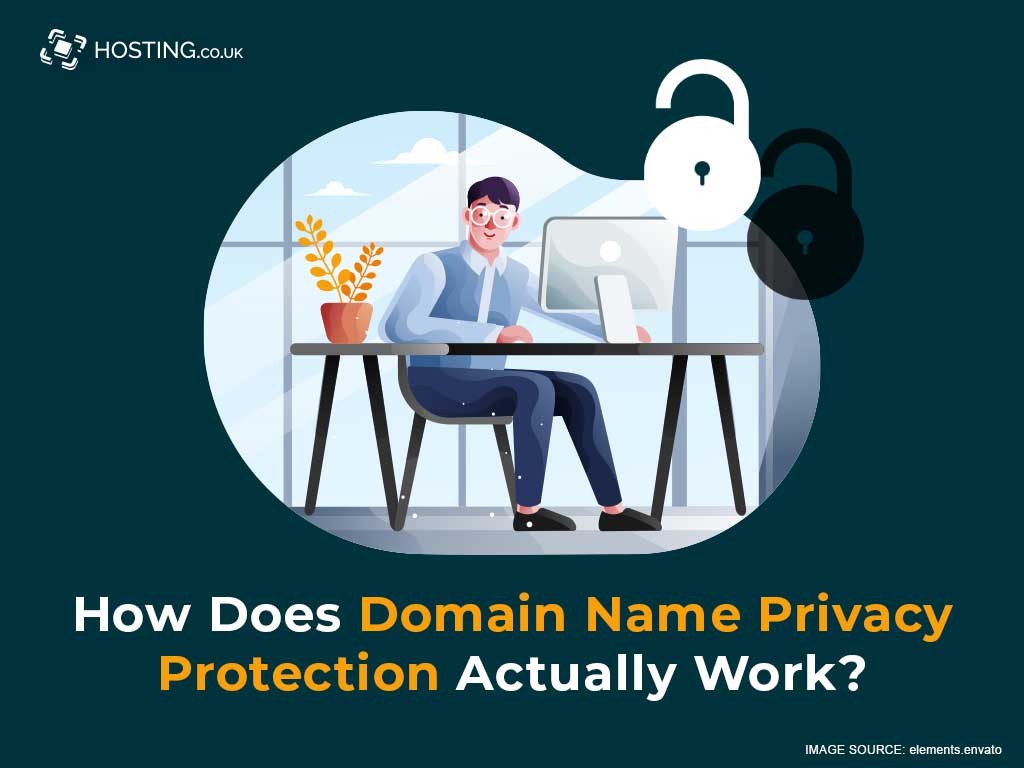Here’s something lots of people don’t know about registering domains. When you register a domain, you have to leave your contact information with your domain registrar or web host. This contact information includes your legal name (no usernames), your home address, your phone number, and your email address. Once you’ve successfully bought your domain, your contact information is entered into a public database. This database is the WHOIS database, as in “WHO IS the owner of this domain name?” To protect your sensitive contact information, you’ll need domain name privacy protection.
If someone ever wants to know who owns your domain, they’ll only need to perform a search called a WHOIS lookup. Without domain privacy, they’ll be able to see all the information you shared with your registrar.
But what is domain name privacy protection, and how does it actually work?
Table of Contents
What is domain name privacy protection?
Domain privacy services were created to secure the information that’s publicly available on the WHOIS database. Domain privacy makes it impossible for anyone to find your private contact information by performing a simple WHOIS lookup, which means you’ll be protected from spamming, scamming, and cyberstalking.
Simply put, domain name privacy protection is a paid add-on that keeps your personal information hidden on the publicly accessible WHOIS database. And most importantly, you can get this service from your domain registrar or your web host.
How does domain name privacy protection actually work?
When you get domain name privacy protection, in exchange for a monthly or annual fee, your web host or domain registrar will cloak specific parts of your WHOIS data, including your home address, phone number, or email address.
Whenever anyone performs a WHOIS lookup on your domain, your domain name privacy protection service will forward the request for this information to a proxy server or other secure portal. This means that your private contact information will not be publicly accessible.
Instead of seeing your private contact information, whoever tries to find your information on the WHOIS database will see a notification declaring that the information they’ve requested is protected by a third-party security provider, and instead of seeing your contact details, they’ll see the contact details of a forwarding service.
This gives you, the owner of the domain, more control over who sees your private contact information because, if you choose, you can still allow access through the proxy server!
How domain privacy keeps you safe on the internet
Without domain privacy, your personal information would be readily available on the internet. It’s lucky that when you buy a domain from our web hosting company, you can ask for domain name privacy protection with your domain!
You can always add domain privacy after you’ve bought your domain, but it’s better to buy it at the beginning, so you have domain privacy right at the outset.
Here are some ways domain name privacy protection keeps you safe.
1. Less spam
When your contact information is publicly available on the internet, this opens you up to getting a lot of spam. Not all spammers have bad intentions. Some of them might genuinely be trying to get in touch to offer deals on products you might actually need. But the internet is a massive place. So, you won’t just be getting unsolicited messages from two or three people. We’re talking hundreds, maybe thousands of people trying to get you to buy their gadgets and widgets. Your inbox will be flooded with unwanted messages, burying the messages you actually do want to get, and the notifications alone are enough to drive you up the wall.
Best to prevent the whole thing altogether, we think.
2. Protects your identity
Identity theft can ruin your credit score, your reputation, and your relationships. Some identity thieves aren’t even after your bank account. They just want to make life as miserable for you as it is for them. Protect yourself from these miscreants by hiding your contact information online. (While protecting your information with domain privacy, try not to put your personal contact anywhere else on the internet. That’s if you can help it.)
3. Prevents your past from coming back to haunt you
People say things they regret. Some of the views you once vowed you’d hold forever would make you cringe to hear them now. Surely, you don’t want any of those fiery opinions to be linked to your professional website. You’d be surprised how many people are perfectly fine with doxing you (that is, releasing your contact information on the internet) just because you said something they didn’t think was very accurate or very nice.
Protect yourself and your family by hiding your contact information from overzealous people with a bit too much time on their hands.
How to get domain name privacy protection
If you want domain name privacy protection, so you can keep your data hidden from prying eyes, all you have to do is contact our support team and ask for WHOIS privacy!
Wrapping up
You can’t escape leaving your personal contact information with your web host or domain registrar, but you can prevent it from destroying your life. Protect your identity on the internet with domain name privacy protection.
